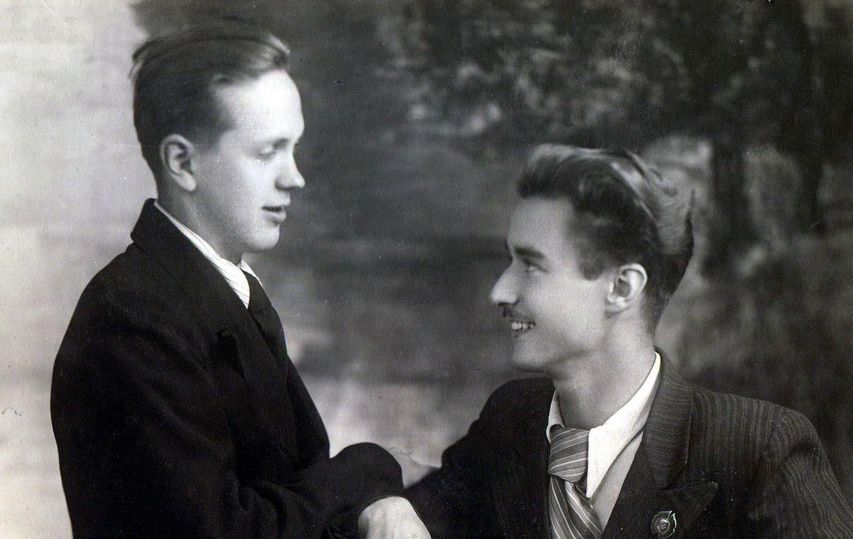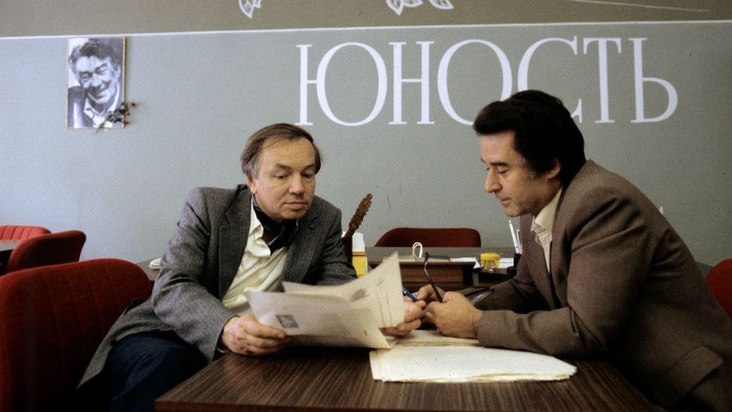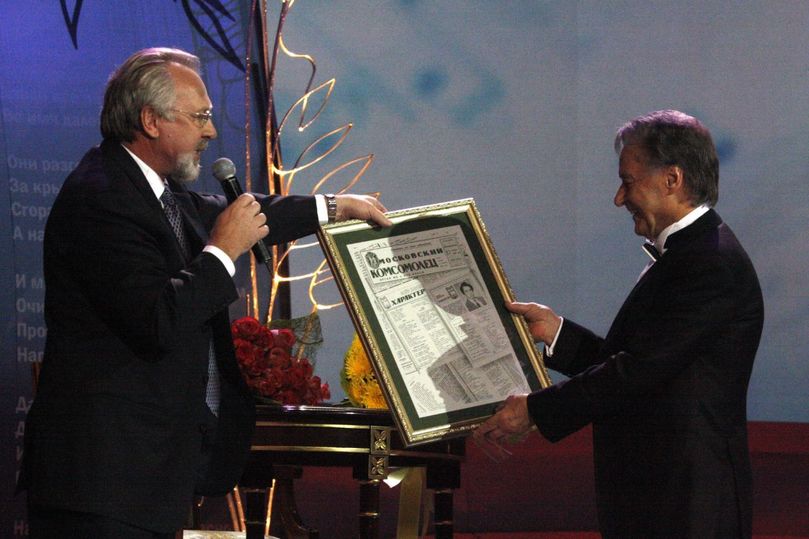“A poet is always the nomenclature of happiness”: we remember Andrei Dementiev
[ad_1]
“I owe all the best in myself to my parents”
The future poet was born on July 16, 1928 in Tver (at that time – Kalinin). Mother – Maria Grigoryevna, father – Dmitry Nikitovich, agronomist, a man with a difficult fate. A graduate of the Timiryazev Academy before the war worked as a researcher at an experimental station, published in the newspaper “Rural Life”. For an anecdote told to a friend, he was convicted and sent to the Gulag for five years. After that, he received a ban on living in big cities.
While the father was in prison, the family survived as best they could, existed literally on the verge of poverty. Andrei Dementiev, recalling those difficult events, then wrote:
I remember many years ago
When during the war we were starving with my mother,
I kept dreaming of finding a magical treasure,
Where was the bread and butter
And bags of semolina.
As soon as his father returned, life became easier: he built a grinding machine and began to take orders for sharpening knives and scissors, worked as a hairdresser. But life was still hectic: the head of the family was hidden in the basement from the district police.
It was his father who instilled in his son a love of literature. As Andrey later recalled in an interview: “I was 3-4 years old, my father worked as a hairdresser to feed his family, but every evening he sat on the edge of my bed and read Pushkin, Russian fairy tales, Kipling’s Mowgli. He accustomed me to literature, and I am infinitely grateful to him for this – that my father introduced me to this world.
In order to somehow help the family, Andrei tried to enter the military medical academy (there the students were on state support), where he was not accepted. But he entered the Institute of International Relations, but left when he heard about the expulsion of a student whose grandmother was repressed (like his father). In 1946, he nevertheless switched to studying at the Pedagogical Institute of his native city.
In 1948, he first published the poem “To the Student” in the newspaper Proletarskaya Pravda. Since the passion for poetry did not subside (Andrei wrote poetry tirelessly, starting from school), he, on the recommendation of the famous poets Sergei Narovchatov and Mikhail Lukonin, left Tver in 1949 and became a student at the Literary Institute. Gorky in Moscow. After graduating from which in 1952 Andrei returned to Tver, where he managed to work as an employee of the rural newspaper Kalininskaya Pravda, head of the Komsomol life department of the editorial office of the Smena newspaper and editor of the Kalinin book publishing house.
In 1967, having moved to Moscow, he headed the poetry department at the Young Guard publishing house. And in the early 70s, Yunost began in his life – the most popular youth literary magazine: first as deputy editor-in-chief, and after the departure of Boris Polevoy, he headed it. Under him, Yunost reached its peak with a circulation of 3.3 million copies, it published many talented writers and poets, among whom were Vasily Aksenov, Bulat Okudzhava, Boris Vasiliev and others.
Anna Pugach, who actively preserves the memory of Andrei Dementiev, recalled several stories that reveal his personality.
As the editor-in-chief, he himself answered readers’ letters. By the nature of my work, I somehow met the head of the Kremlin guard, a general. At some point, he suddenly says: “You know, I was brought up in a military garrison in Vladivostok, I wrote poetry. Somewhere at the age of 14-15 he sent them to the magazine “Youth”. And you can imagine, Dementiev himself sent me a response, sorted out my poems, wrote how to continue to work. I remember this for the rest of my life. I did not become a poet, but what the editor-in-chief answered me … “. And the circulation is three million! Then many letters were written, they were carried in bags to the editor.
I recently got into a conversation with Georgy Zaitsev, he studied at the Ryazan Airborne Command School. The man told how he once sent his poems to Yunost, and one reviewer answered him: “Thank you, the editors were not interested in your poems.” And suddenly he received a two-page review from Dementyev, and it says: “You know, your poems are not bad, you need to work on them. Send us what else you have, we’ll try to print it.” And he sent, and all printed. Now, it seems, he is already retired, but he used to be one of the heads of the poetry department at the Young Guard publishing house, a famous poet. Such human actions were characteristic of Andrei, holding a high post, he did not bronze.

At the beginning of 1992, it was restless at Yunost.
“It was a period when Gorbachev announced that the problems of the collective should be solved by the collective itself,” says Anna Pugach. – After that, splits began, they affected the Sovremennik, Taganka theaters, the Novy Mir magazine … We formed not one, but three whole Youths. And Andrew was categorically disagree with this. He tried to take new people to the leadership: to the position of deputy Yuri Polyakov and Mikhail Gusman, now a well-known TV journalist who communicates with kings and presidents (TV program Formula of Power) and one of the leaders of TASS. Andrei believed that the magazine should have a new “legend”, a new face.
But there were “collective” votes, he was elected chairman of the labor collective, but Polyakov and Gusman were not. Then he, without saying anything (he was a decisive person), called Komsomolskaya Pravda, there was such a heading “Night Call”, and said: “This is Andrey Dementyev, interview me. I’ve made a decision, I’m leaving the magazine.” For many it became a sensation. How so? A successful magazine, a large circulation, he is on a horse and suddenly leaves!
Of course, Andrew was worried. And shortly before that, we went down to the Sofia restaurant (it is in the same building as the magazine) and met Galina Vishnevskaya there. Andrei was still thinking, and the wise Vishnevskaya said: “Andrey, everything in life must be changed. Well, today you’re sitting here, and tomorrow your office will be 200 meters from here. What’s the problem?” These words had a profound effect on him. And that’s it, after that he is nowhere.
Andrey Dementiev dedicated the poem “I owe nothing to no one” to this dramatic event in his life, which was written on the night of his departure:
I don’t owe anything to anyone.
Should not swear allegiance to the country
For the fact that with her I lived to poverty.
Because a third of my land is on fire.
I don’t owe anything to anyone.
“Young wolves” are not a decree for me.
They are, of course, much younger than us,
But not more talented than us.
And the new world is nothing like the old one
Among their strife and troughs.
I don’t owe anything to anyone
Because I never lived on credit.
A year after that, the poet could not find a job, until the head of Russian television, Oleg Poptsov, invited a friend from Komsomol work to broadcast the Family Channel. Then there was a business trip to Israel as the chief of Russian television in the Middle East and a joyful return home, to another Russia. In 2001, the author’s program “Turns of Time” was launched on Radio Russia, the last release of which Andrey Dementyev spent on June 23, 2018, three days before his death.

“I am very sorry that my Anyuta Pugach appeared to me late”
One of the sources of inspiration is a woman and love for her. He searched for a long time, he was wrong, he was deceived, but he was honest in love and delusion. Andrei Dementyev expressed his attitude towards women in one of his later interviews: “Now, after many novels, I am convinced that any woman with whom you were in love gave you happiness. And you no longer have the right to think and speak ill of her. Therefore, I remember my ex-wives with warmth, especially since they gave me children, and for this I bow low to them.
And on his way, a gift of fate – a kindred soul: “The only love – for life (I only really regret that she came to me late) – this is my Anyuta Pugach.” To her, his beloved wife, he dedicated more than one verse, the most revealing of which is “Synonymous with happiness for many …”.
Synonymous with happiness for many –
Wife.
When she’s around all my life…
And one.
Someone is lucky…
But it happens otherwise.
My friend from the only
The wife is crying.
He could probably leave her
When would loneliness
Overthrew without her.
Family life –
Like an unexpected motive.
I sang three times…
And, as you can see, he is alive.
Tired of illusions
Miraculously grieving,
I believed,
That I will meet you anyway.
That life shouldn’t
Break with the dream
No matter how far
She neither was.
And as if hearing
You quietly entered
And she was struck by her beauty.
… Then she married us
Dawn in the sky.
Leaving your reflection
In loving eyes.
“My whole life is in verse”
The poet treated writing poetry quite easily: a line came, inspiration came – he wrote it down and immediately put it aside. “Poetry is not prose – it is, first of all, impressions.” And the impressions fade very quickly, which Dementiev knew about, so he did not sit on the next work for a long time:
– He parted with his poems very easily, did not tremble over manuscripts. He will read something to me, and if I say that I don’t like it, he immediately throws it away. This perfectly reflects his character as a poet and a person: do not tremble over what you “wrote out of yourself” there. At the time of “Youth” he was very friendly with Andrei Voznesensky, the poets came up with the following game. They brought verses to each other, covered part of the lines with their palms, read, and if the verse did not lose anything without them, then the closed lines were discarded. Thus, the excess was quickly cut off.

Because of the ease in writing poetry, it is now difficult to date them: it seems that this is a poem of such and such a year, but in another book it is the same, but in short, some lines from it have been altered. Andrei never put down the date himself. The trouble was with him: he lived outside of time, – Anna Pugach recalls.
Andrey Dementyev in poetry always looked for simplicity of expression and strove for truth, which he mentioned more than once in letters to friends and in poetry. For example, in the poem “Eugene Yevtushenko”:
Poetry, like love, is a calling.
And you were called by her in heaven.
And on earth it is like a punishment,
Like joy with pain
Like excitement and fear.
The Almighty tested you with fashion
And the glory earned by labor.
And someone’s envy indecent muzzle
She leaned over the desk again.
But from the first lines was always superior
The sincerity that you suffered from.
And that’s why you survived these battles,
And overcame an insignificant lawlessness.
Although your genius has been cursed more than once,
The soul remained true to kindness …
And so I wanted to see a friend next to me,
But the eternal ones did not come.
It’s not time to sum up yet.
There is no time limit for your inspiration.
Although it is time for us to think about God,
But only in the sense of loyalty to him.
Forgive me, Poet, for the remoteness of fate,
For the rare opportunity of good meetings.
We sometimes love silently
What a sublime speech.
This weekend, the poet’s homeland, Tver, is hosting the Dementiev-Fest festival, within which the results of the VII All-Russian competition of young poets “Green Leaf” will be summed up. Modern poets and prose writers will hold master classes. And the festival will end with a big concert with the participation of theater, film and pop stars.
And on July 19, a photo exhibition “Andrey Dementiev – Fatherland in verse. To the 95th anniversary of the poet. Each stand contains photographs, a verse and its comments. The uniqueness of the exhibition is also in the QR codes affixed to all stands – they redirect to a video where the great Russian poet Andrei Dementiev or his friends read their poems.
[ad_2]
Source link






